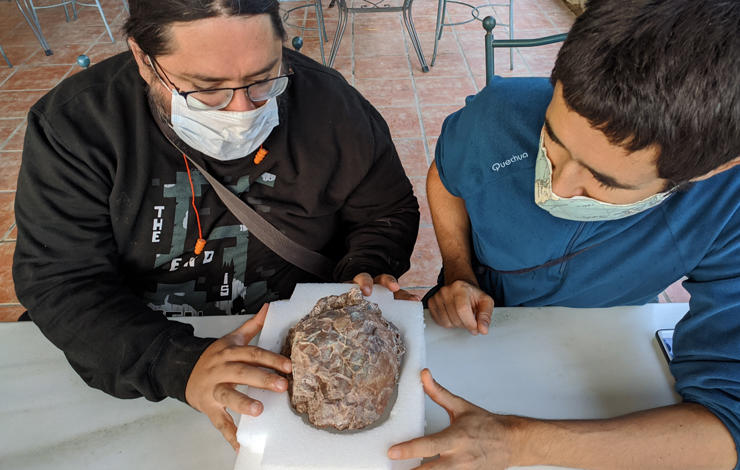22-09-2020

A team of Portuguese and Spanish paleontologists excavated, near the Spanish Pyrenees, a 68 million-year-old deposit that preserves a large dinosaur nesting area.
So far, paleontologists have identified more than twenty eggs on the surface but there could be more than a hundred. The eggs, spherical and about 20 centimeters in diameter, retain an exceptional state of conservation and are grouped, suggesting the existence of several nests. A preliminary analysis indicates that they belong to the titanosaurs sauropod dinosaurs, four-legged herbivores with tails and long necks, which can reach 30 meters in length.
The area was detected at the beginning of the year by José Manuel Gasca, Spanish paleontologist during a trail running session. Gasca usually collaborates with the NOVA School of Science and Technology (FCT NOVA) team, where two of Europe's greatest dinosaur egg specialists work, namely Octávio Mateus and Miguel Moreno Azanza. After a first assessment at the end of January, the site was notified to the PortugueseDirectorate-General for Cultural Heritage, which authorized this field work. José Manuel Gasca and Miguel Moreno Azanza, who also collaborate with the Lourinhã Museum, are conducting the excavations that take place in September and October. "After traveling the world studying dinosaur eggs on the five continents, I discovered that one of the most significant deposits was located in the mountains, where I played with my plastic dinosaurs as a child", explain Moreno-Azanza who, since 2015, has been working in Portugal, and was born just 20 kilometers from this recent deposit.
Octávio Mateus, leader of the FCT NOVA vertebrate research team, and dinosaur egg researcher for over thirty years, insisted on the importance of the discovery, which he compared with the much more famous world dinosaur eggs from Portugal, with twice the age. Mateus stressed that this work helps to complete the studies on the reproduction of dinosaurs that takes place at FCT NOVA, since in Portugal, although many types of eggs are identified, eggs of titanosaurs have never been discovered, which fills a void of knowledge.
The excavation is part of a research project on the reproduction of dinosaurs, funded by the Portuguese Foundation for Science and Technology. The work is led by Miguel Moreno Azanza and Octávio Mateus and counts with the participation of researchers from FCT NOVA, the Museum of Lourinhã and the Aragosaurus Group of the University of Zaragoza.
Press:
“Paleontólogos descobrem ovos de dinossauros com 68 milhões de anos nos Pirenéus”, Público Online, 22-09-2020
“Paleontólogos descobrem ovos de dinossauros com 68 milhões de anos nos Pirenéus”, RTP Online,22-09-2020
“Ovos de dinossauros com 68 milhões de anos descobertos nos Pirenéus”, TVI 24 Online, 22-09-2020
“Paleontólogos descobrem ovos de dinossauros com 68 milhões de anos nos Pirenéus”, SIC Notícias Online, 22-09-2020
“Descobertos ovos de dinossauros com 68 milhões de anos nos Pirenéus”, Sábado Online, 22-09-2020
“Paleontólogos descobrem ovos de dinossauros com 68 milhões de anos nos Pirenéus”, Visão Online, 22-09-2020
“Paleontólogos portugueses e espanhóis descobrem ovos de dinossauros com 68 milhões de anos nos Pirenéus”, Diário de Notícias, 23-09-2020
“Descobertos ovos de dinossauros com 68 milhões de anos nos Pirenéus”, i Online, 23-09-2020
“Descobertos ovos de dinossauros com 68 milhões de anos nos Pirenéus”, Jornal de Notícias Online, 22-09-2020
“Paleontólogos descobrem ovos de dinossauros com 68 milhões de anos”, Rádio Comercial Online, 22-09-2020
“Paleontólogos portugueses ajudam a descobrir ovos de dinossauros com 68 milhões de anos”, Renascença Online, 22-09-2020
“Equipa ibérica descobre ovos de dinossauro com 68 milhões de anos nos Pirenéus”, TSF Online, 22-09-2020
“Paleontólogos descobrem ovos de dinossauros com 68 milhões de anos nos Pirenéus”, Lusa Online, 22-09-2020
“Descobertos ovos de dinossauros com 68 milhões de anos nos Pirenéus”, Sol Online, 22-09-2020
“Paleontólogos descobrem ovos de dinossauros com 68 milhões de anos”, Notícias ao Minuto Online, 22-09-2020
“Paleontólogos descobrem ovos de dinossauros com 68 milhões de anos”, Diário de Notícias da Madeira Online, 23-09-2020
“Paleontólogos descobrem ovos de dinossauros com 68 milhões de anos nos Pirenéus espanhóis”, DiáriOnline - Região Sul Online, 23-09-2020
“Paleontólogos descobrem ovos de dinossauros com 68 milhões de anos nos Pirenéus”, Impala Online, 22-09-2020
“Descobertos ovos de dinossauros com 68 milhões de anos nos Pirenéus”, JM Online, 22-09-2020
“Paleontólogos descobrem ovos de dinossauros com 68 milhões de anos”, M80 Online, 22-09-2020
“Descobertos ovos de dinossauros com 68 milhões de anos nos Pirenéus”, NiT New in Town Online, 22-09-2020
“Equipa ibérica descobre ovos de dinossauro com 68 milhões de anos”, Plataforma Online, 22-09-2020
“Paleontólogos descobrem ovos de dinossauros com 68 milhões de anos nos Pirenéus”, Porto Canal Online, 22-09-2020
“Paleontólogos descobrem ovos de dinossauros com 68 milhões de anos nos Pirenéus”, Postal do Algarve Online, 22-09-2020
“Descobertos ovos de dinossauros com 68 milhões de anos nos Pirenéus”, Porto dos Museus Online, 22-09-2020
“Descobertos ovos de dinossauros com 68 milhões de anos nos Pirenéus”, Rádio Santana FM Online, 22-09-2020
“Paleontólogos descobrem ovos de dinossauros com 68 milhões de anos”, Smooth FM Online, 22-09-2020